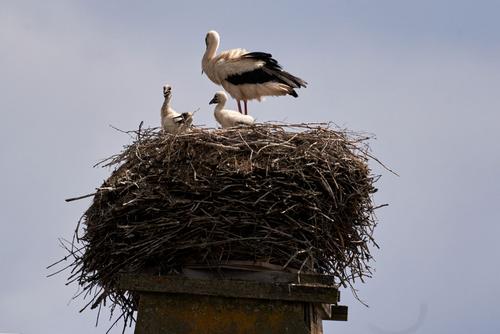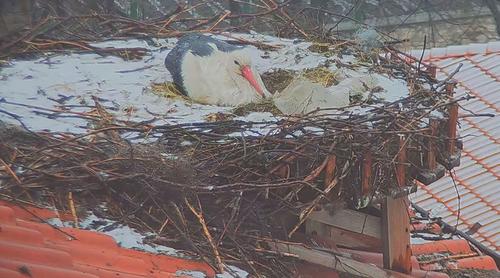++ Only a few storks have fledged in Europe’s stork villages ++ Extremes of weather cause problems for the storks ++ Conservation of green wetlands contributes to the protection of species and reduction of climate change ++

Adults with three young storks on the nest at Rühstädt. For the third year running there was a drought in the Brandenburg stork village.
© Oliver Krause
An unusual sight: a white stork on a snow-covered nest in Bulgaria. There is the danger of eggs and chicks freezing during such wintery spells in spring. Nevertheless, the breeding season in the Bulgarian stork village of Belozem was successful because the adult birds were able to find a plentiful supply of food in the nearby meadows.
© Green BalkansRadolfzell, European Stork Villages. It has been a disappointing breeding season in Europe’s stork villages in 2020. This year’s count of breeding pairs and fledged youngsters confirmed that the population has stagnated in some villages. In many places, this was the worst breeding season for many years. In the stork village of Rühstädt in Brandenburg, for example, which was designated by EuroNatur in 1996, 26 pairs attempted to breed on the village roofs and reared a total of only 26 chicks.
“This is a very low number. Each pair needs to rear at least two young every year in order to maintain the stability of the population in the long term,” said Ilka Beermann, the coordinator at EuroNatur for the European Stork Village Project. Only a few stork villages had a breeding season capable of sustaining existing populations, amongst these the Bulgarian village of Belozem. The reasons for this vary between regions. A late spell of winter weather during the spring meant that the storks following the eastern migration route paused their journey around the Bosporus. “A delayed arrival in the breeding areas and the resulting late start to breeding meant that there was less time for raising the young storks,” said Beermann.
In general, weather conditions are decisive to the success of the breeding season and climate change has meant much greater fluctuations. Whilst the unusually wet spring in the Spanish stork village of Malpartida de Cáceres caused high losses of young storks, it was the excessive heat and drought for the third year in succession that was the problem in the Brandenburg village of Rühstädt. Many chicks starved in the nest.
“The white storks are suffering from the effects of the man-made climate crisis which will presumably only get worse in the coming years,” said Gabriel Schwaderer, Executive director of EuroNatur. “It makes it all the important to protect the habitats of these fascinating species. The conservation and restoration of wet meadows and pastures not only help the storks in a very immediate way, but also have a positive effect on the climate,” Schwaderer continued.
Background information:
- Since its founding, the conservation charity EuroNatur has been active in the protection of European migratory birds. It has particularly concentrated on the Adriatic Flyway, which runs across the Balkans, the Adriatic and southern Italy to North Africa. Click on this link to watch a short film on bird migration across the eastern Adriatic: https://www.youtube.com/watch?v=arJenBAVr10
- Since 1994, EuroNatur has been conferring the title of ‘European Stork Village’ to communities or villages which have been particularly committed to stork conservation. These 15 places are now internationally recognised as contributing significantly to European cultural and wildlife heritage. Click on this link to find out more about the network and the latest figures of nearly all villages: https://www.storkvillages.net/
- This video from Rühstädt shows the ringing of the young storks in the nest at the beginning of July this year: https://www.youtube.com/watch?v=NAM2KnIsCtk&feature=youtu.be
Further enquiries: Christian Stielow, E-Mail: christian.stielow(at)euronatur.org, Tel: +49 7732 927215


